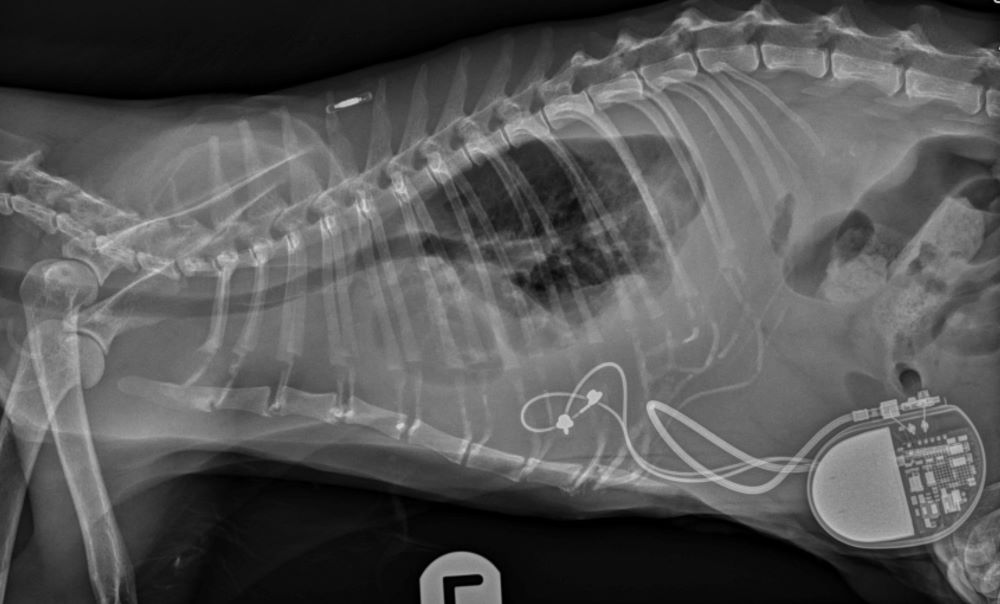New RVC study reveals positive outcomes of feline epicardial pacemaker implantations
A new study led by the Royal Veterinary College (RVC) has shown positive clinical outcomes and quality of life for cats suffering from severe heart conditions through the implantation of epicardial pacemakers (EPs). The use of EP implantation to facilitate artificial cardiac pacing (ACP) effectively resolved symptoms including abnormally slow heart rates (bradyarrhythmia) in cats.

This follows a recent study showing similar positive impacts of EP implantation in dogs, and explores and confirms the use of EPs to treat feline heart conditions, necessitating ACP as a treatment method of choice for vets.
Epicardial pacemaker implantation has historically been less common in cats than dogs as they are considered to better tolerate bradyarrhythmia. A lack of veterinary literature also meant a gap in knowledge around the procedure and outcomes linked to quality of life. While this type of surgery has typically been reserved for cats presenting with symptoms such as loss of consciousness (syncope), lethargy or congestive heart, the study now confirms EP as a beneficial surgical opportunity, resulting in a longer, and better quality of life for these cats. This knowledge will help vets and clinicians feel more confident in recommending and performing this surgery in the future. It also highlights the importance of a joined up approach between cardiology and cardiothoracic specialists in these types of cases.
The research team, led by Dr Matteo Rossanese, Senior Lecturer in Small Animal Soft Tissue Surgery and Co-Head of Soft Tissue Surgery at the RVC, examined the complications and outcomes for cats post implantation by reviewing medical records of 39 cats from four UK animal hospitals. To determine the overall improvements in clinical signs and health-related quality of life (HRQoL), the team used a two-part survey. This assessed HRQoL indicators including cat activity levels and willingness to exercise, play and interact with humans or other pets as well as owner satisfaction.
Other key findings from the study included:
- Primary reasons for referral included collapsing episodes and bradycardia.
- Third-degree atrioventricular block was found to be the most common indicator for pacemaker placement.
- Owners reported a good improvement in their cat’s general condition following implantation.
- Owners reported a very high level of satisfaction with an average of 9.9 out of 10.
- Intra- and post-operative complications were reported in a small number of cases (three and 14 respectively). Despite complications, the study noted that these did not adversely impact overall outcomes.
Dr Matteo Rossanese, Senior Lecturer in Small Animal Soft Tissue Surgery and Co-Head of Soft Tissue Surgery at the RVC, said:
“I am incredibly proud of the work our team has done to explore the use of epicardial pacemakers in cats. This study not only highlights the potential for significant improvements in quality of life for feline patients but also provides valuable evidence to guide clinicians in making confident decisions about this life-changing procedure. It has been a privilege to lead this study alongside a dedicated team of colleagues, and I hope these findings will encourage further advancements in veterinary cardiology.”
The RVC’s Small Animal Referral service based at the Queen Mother Hospital is a leading, internationally recognised centre for veterinary cardiology. It provides advanced diagnostics and treatment for dogs and cats with either congenital or acquired heart conditions; something that only a few centres can perform worldwide. The RVC’s cardiology team works alongside its cardiothoracic practice, enabling options for surgical candidates across both service areas to be discussed including medical management, minimally invasive interventional cardiac catheterisation or cardiac surgery (open-heart surgery with cardiac bypass). This ensures consideration for the most suitable treatment plans and the very best care for cardiac patients.
For more information on services offered, visit: https://www.rvc.ac.uk/small-animal-vet/specialist-referrals/clinical-services/veterinary-cardiology.
Notes to Editors
Reference
Rossanese M, Brockman D, Chanoit G, et al. Epicardial pacemaker placement in cats is associated with resolution of clinical signs and excellent quality of life. J Am Vet Med Assoc. 2024; doi:10.2460/javma.24.09.0586
Link to article: https://doi.org/10.2460/javma.24.09.0586
Reference for paper on epicardial pacemakers in dogs:
Rossanese M, Brockman D, Chanoit G, et al. Epicardial pacemaker placement is associated with low complication rate and improved quality of life in dogs. J Am Vet Med Assoc. 2024;262(10):1–10. doi:10.2460/javma.24.04.0232
For media enquiries, please contact:
- Jasmin De Vivo at jasmin.devivo@plmr.co.uk or rvc@plmr.co.uk
- Press Line: 0800 368 9520
About the RVC
- The Royal Veterinary College (RVC) is the UK's largest and longest established independent veterinary school and is a Member Institution of the University of London.
- It is one of the few veterinary schools in the world that hold accreditations from the RCVS in the UK (with associated recognition from the AVBC for Australasia, the VCI for Ireland and the SAVC for South Africa), the EAEVE in the EU, and the AVMA in the USA and Canada.
- The RVC is ranked as the top veterinary school in the world in the QS World University Rankings by subject, 2024.
- The RVC offers undergraduate and postgraduate programmes in veterinary medicine, veterinary nursing and biological sciences.
- The RVC is a research-led institution, with 88% of its research rated as internationally excellent or world class in the Research Excellence Framework 2021.
- The RVC provides animal owners and the veterinary profession with access to expert veterinary care and advice through its teaching hospitals and first opinion practices in London and Hertfordshire.

